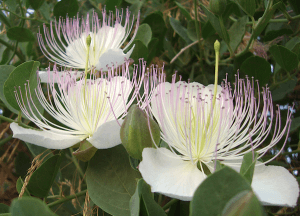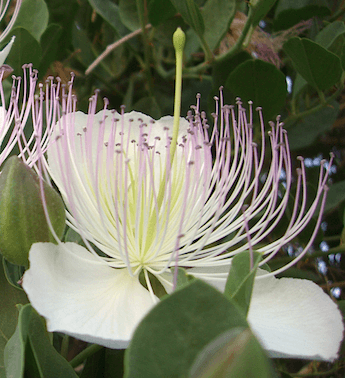
Consider the lilies, how they grow: they neither toil nor spin, yet I tell you, even Solomon in all his glory was not arrayed like one of these. But if God so clothes the grass, which is alive in the field today, and tomorrow is thrown into the oven, how much more will he clothe you, O you of little faith! (Luke 12:27-28)
If you’ve ever visited Israel, you know that during the summer months the land is covered in parched brown sun-baked grass that has sprouted up during the rainy season, and then baked by the sun’s heat.
It’s hard not to notice the caper bushes with their gorgeous white blossoms. They begin unfurling at night so that the blooms dazzle the rising sun. By lunchtime their petals are limp, however, then entirely withered by late afternoon. Are they what Jesus was talking about?
Jesus could easily have been pointing toward a scene like this as he was teaching. He, like other rabbinic teachers, taught in open air settings and noted physical examples from the setting around himself. Often knowing his physical surroundings — his Jewish life and first-century reality – is key to unlocking his words.
You might have the impression that knowing what kind of flower Jesus was pointing at is the key to understanding his words. The more I study, though, the more I’m realizing that often it’s more important to know the Scriptures that he subtly interwove into his theme. The texts that he is using from the Hebrew Bible are far more important than the flowers he was pointing out.
The Flowers in the Scriptures
In this parable Jesus seems to have Isaiah 40 very much in mind. It reads,

All flesh is grass,
and all its beauty is like
the flower of the field.
The grass withers, the flower fades
when the breath of the LORD blows on it;
surely the people are grass.
The grass withers, the flower fades,
but the word of our God will stand forever.
(Is. 40:6-7)
Our lives are short, fragile and end all too soon. As individuals, we are weak. You might think that imposing governments are far more permanent. Powerful nations will long outlast the individuals within them. Hardly so, continues Isaiah:
To whom then will you liken God,
or what likeness compare with him?
It is he who sits enthroned above the circle of the earth,
…who brings princes to nothing,
and makes the rulers of the earth as emptiness.
Scarcely are they planted, scarcely sown,
scarcely has their stem taken root in the earth,
when he blows on them, and they wither,
and the tempest carries them off like stubble. (Isaiah 40:18, 22, 23-24)
Notice here that not only are individual human lives compared to grass, but princes and rulers are too. God “plants” and “sows” kingdoms, and with a mere puff he causes the greatest kingdoms to shrivel up and wither away. We hold the mighty empires of our world in awe and see a powerful government as a source of true security. From God’s perspective the greatest emperors are insignificant and their reign is fleeting. God is the ultimate king – he alone sits enthroned about the earth.
Isaiah 40 goes on to conclude,
Have you not known? Have you not heard?
The LORD is the everlasting God,
the Creator of the ends of the earth.
He does not faint or grow weary;
his understanding is unsearchable.
He gives power to the faint,
and to him who has no might he increases strength.
Even youths shall faint and be weary,
and young men shall fall exhausted;
but they who wait for the LORD
shall renew their strength;
they shall mount up with wings like eagles;
they shall run and not be weary;
they shall walk and not faint. (vs 28-31)
Likewise Jesus says:
And do not seek what you are to eat and what you are to drink, nor be worried. For all the nations of the world seek after these things, and your Father knows that you need them. Instead, seek his kingdom, and these things will be added to you. (Luke 12:29-31)
Jesus was reminding his listeners that they don’t need to worry. God would not ever get tired of sustaining them. If they wait on the LORD, he promised to strengthen even the weakest.
Jesus likely had another passage in mind. Listen to what Psalm 103 says about our days being like grass:
 As for man, his days are like grass;
As for man, his days are like grass;
he flourishes like a flower of the field;
for the wind passes over it, and it is gone,
and its place knows it no more.
But the steadfast love of the LORD is from
everlasting to everlasting
on those who fear him,
and his righteousness to children’s children,
to those who keep his covenant
and remember to do his commandments.
The LORD has established
his throne in the heavens,
and his kingdom rules over all.
(Psalm 103:15-19)
The psalm writer, like Isaiah, knew that our lives our fragile, but God’s faithful love is never-ending. Both passages point out that God watches over the lives of those who trust in him and obey his word. They are the ones who “seek his kingdom,” who enthrone God as king over their lives. They know that earthly thrones may crumble and governments may topple, but God’s kingdom will never end.
Listening through Jesus’ Scriptures
Did Jesus’ listeners think of Isaiah 40 and Psalm 103? Psalms and Isaiah were some of the most well-known of the Hebrew Scriptures. His observant Jewish listeners very likely did. Even those who didn’t know their Bible could appreciate Jesus’ parable through the illustration of the flowers and grass. But for those who recalled their Scriptures, Jesus’ words would have far more power.
The ephemeral beauty of the flower wouldn’t have impressed them as much as God’s own words from ages past. To those listeners, Jesus would have been affirming and deepening what they already knew, and bringing it to a new level.

Terri says
As always, Lois, you provide wonderful understanding and insight. Appreciate you and your work.
Brett says
Thanks for this Lois. I’m glad your “back at it”. Hope your summer has been joyful.
Deb Allen says
Beautiful and eloquent. Peeling back the layers to a better understanding of Jesus’ words and teachings.
Charles Drennon says
We are living in times that could consume us with anxiety if we let ourselves forget the promises of our LORD. His Kingdom does rule over all, no matter the amount of temporal upheaval in our world. Lois, please keep reminding us of such truth! May God bless.
Barbara Hyland says
I have been a supporter of Christian ministries for years. However, thanks to you and others I have come to realize we have been missing to so much in our reading of scripture. We read everything with our Gentile mindset instead of focusing on Jesus as a teacher of Torah. I think you for being part of that good work. Paul also has been reread. Started back in the 1st century when the Gentiles took over the assembly. The New Covenant is not the church!!
Karen Kuhn says
I always enjoy learning from you! I so appreciate your insights.
Rena says
You have explained Jesus words out so well. It makes the words come alive, thank you
Paul Wallace says
Wow! So Jesus might have been implying to all who were looking for a militant Messiah that Rome too would not last long in God’s time table. Nor would the Jewish nation for that matter. Caiaphas was so worried about losing their place and nation, but God would blow on it in just 40 years later. To those who had ears to hear, the emphasis was turning them from an earthly kingdom to the eternal kingdom.
Kala Ada says
Wow..nice commentary
Pat Cuttier says
Thank you for this wonderful reminder during turbulent times in our nation.